|
|
|
Sort Order |
|
|
|
Items / Page
|
|
|
|
|
|
|
| Srl | Item |
| 1 |
ID:
074640


|
|
|
|
|
| Publication |
2006.
|
| Summary/Abstract |
This article argues that Latin American regionalism in international law is a direct consequence of a 'creole legal consciousness' meaning a shared basic assumption about the origins of law in the region (as coming from Europe through Roman law and Spanish law) as well as a belief in the uniqueness of an American (as in the continent) interpretation and development of that law. Those who participate of such a consciousness assume themselves as being part of the metropolitan centre (as descendants of Europeans), while at the same time challenging the centre with notions of their own regional uniqueness (as natives of America). Creole consciousness about international law was an instrument of nation and region building during the 19th century. This led to a discussion of the actual existence of a regional international law '[Latin] American international law' (derecho internacional Americano) in the first half of the 20th century. The article concludes with a look at how a regional perspective was also inherent in the construction of a human rights regime in the second half of the twentieth century.
|
|
|
|
|
|
|
|
|
|
|
|
|
|
|
|
| 2 |
ID:
074647


|
|
|
|
|
| Publication |
2006.
|
| Summary/Abstract |
Peace-building is now a major aspect of the work of international institutions. While once the international community aimed simply to maintain a ceasefire and restore some form of stability in conflict zones, since the early 1990s there has been increasing attention given to creating peaceful and democratic societies through international intervention. A common problem in international peace-building projects over the past decade has been the position of women, particularly their limited involvement in the institutional design of peace-building strategies and the possibility that peace-building may actually reduce local women's agency in society. This article discusses the modern enterprise of peace-building and identifies international legal principles that can serve as a framework for peace-building projects in which women's lives are taken seriously.
|
|
|
|
|
|
|
|
|
|
|
|
|
|
|
|
| 3 |
ID:
074642
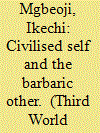

|
|
|
|
|
| Publication |
2006.
|
| Summary/Abstract |
In the aftermath of the military conflicts of 1936 - 45, there seemed to be a global renunciation of war as an instrument of state policy. Shortly thereafter, however, decades of ideological attrition between the major powers and the inherent perversion of postcolonial states reduced the solemn declarations of 1945 to ineffectual rhetoric. Underpinning the decline and demise of a human-centred approach to global peace and security is the enduring notion of the civilised self and the barbaric other. The polarisation of humanity between camps of the savage and the civilised has continued to animate international policy making despite denials. This paper argues that a rejection of the polarities is imperative for the success of the emergent concept of human security.
|
|
|
|
|
|
|
|
|
|
|
|
|
|
|
|
| 4 |
ID:
074637


|
|
|
|
|
| Publication |
2006.
|
| Summary/Abstract |
The very meaning of the term 'Third World' has become disarticulated, with corresponding changes to the politics and structure of international law. At stake is the question: is international law of any use to the Third World, and if it could be so, how must one rethink it? This article argues that there is now a distinction between hegemonic and counter-hegemonic international law, and that the future of international law and the Third World are intricately intertwined in contributing to a counter-hegemonic international law. But, in order to achieve this goal, the past strategies of Third World engagement through international law, for example through the discourses of human rights and development, need to be seriously rethought. The article offers a critical analysis of the hegemonic nature of human rights and development discourses in contemporary international law.
|
|
|
|
|
|
|
|
|
|
|
|
|
|
|
|
| 5 |
ID:
074635


|
|
|
|
|
| Publication |
2006.
|
| Summary/Abstract |
The colonial and postcolonial realities of international law have been obscured by the analytical frameworks that governed traditional scholarship on the subject. This article sketches out a history of the evolution of international law that focuses in particular on the manner in which imperialism shaped the discipline. It argues that colonialism, rather than being a peripheral concern of the discipline, is central to the formation of international law and, in particular, its founding concept, sovereignty. It argues that international law has always been animated by the civilising mission, the project of governing and transforming non-European peoples, and that the current war on terror is an extension of this project.
|
|
|
|
|
|
|
|
|
|
|
|
|
|
|
|
| 6 |
ID:
074646
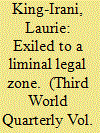

|
|
|
|
|
| Publication |
2006.
|
| Summary/Abstract |
For the past 60 years Palestinians have been positioned in a liminal political zone in a global system of nation-states. Although the Palestinian refugee crisis is the oldest and largest in the world, Palestinians are also relegated to a liminal legal zone in that the UN-established institutions such as the unrwa to deal with the Palestinians' needs and demands through exceptional channels outside the jurisdiction of the UN's human rights regime. As a consequence, Palestinians' rights are always open to question and frequently violated, whether they are living under occupation, as second class citizens in Israel, or as refugees in surrounding Arab countries. Although the Palestinian diaspora is situated in a variety of countries, legally the Palestinians are nowhere. This article examines the liminal legal zone to which Palestinians have been exiled, particularly in regard to refugee rights, but also in the context of international humanitarian law and international prosecution of war crimes committed against Palestinians. In examining this liminal legal zone, the article also notes that in the age of the global 'war on terror', we are all at risk of becoming Palestinians as legal guidelines and guarantees are eroded.
|
|
|
|
|
|
|
|
|
|
|
|
|
|
|
|
| 7 |
ID:
074641


|
|
|
|
|
| Publication |
2006.
|
| Summary/Abstract |
This article provides a brutally condensed history of the Egyptian legal elite, tracing their rise to power following the introduction of legal reforms in the late 19th century, their fall in the 1950s, and the possibility of a renewed elite status based on 'rule of law' reforms introduced since the 1990s. I argue that 'rule of law' reforms had a considerable effect in raising the profile of Egyptian legal practitioners and empowering them as instrumental decision makers on multiple questions of public concern. In particular, I argue that the history of the Egyptian legal elite makes it very difficult to either embrace the rule of law as a panacea or dismiss it out of hand as a colonial ploy.
|
|
|
|
|
|
|
|
|
|
|
|
|
|
|
|
| 8 |
ID:
074644
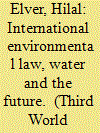

|
|
|
|
|
| Publication |
2006.
|
| Summary/Abstract |
This article focuses on the development of international law principles in the area of fresh water, one of the major emerging concerns at the global level. These principles, from the period of abundance to scarcity of fresh water, are evaluated parallel to changing economic, geopolitical and environmental conditions of world politics. Currently over a billion people in the Third World do not have access to safe drinking water. Is current international law capable of addressing the challenge of global water scarcity in 21st century? I will evaluate the moral principles of international human rights, and economic principles of free market ideology to solve the problem of access to fresh water resources for all for the future.
|
|
|
|
|
|
|
|
|
|
|
|
|
|
|
|
| 9 |
ID:
074634
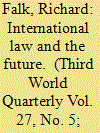

|
|
|
|
|
| Publication |
2006.
|
| Summary/Abstract |
Globalisation, 9/11 and the USA's 'war on terror' have shaken the foundations of 21st century world order, leading to consensus on the need for an effective and benevolent form of global governance, but there is little agreement on how this should be implemented. Distinguishing between Westphalian pessimists and optimists (the former doubtful of the state system's ability to solve the current crisis; the latter convinced that said system can be adapted and modified to do so), this article examines the different approaches currently being taken to global governance, concluding that a post-Westphalian solution must be achieved. However, it rejects the notion of benevolent (US) empire, with its reliance on militarisation and pre-emptive action, and argues instead for a law-oriented approach espousing cosmopolitan values and striving for global justice and global democracy. The rise of a global civil society and the growing influence of transnational social forces are among the trends that suggest this may be possible.
|
|
|
|
|
|
|
|
|
|
|
|
|
|
|
|
| 10 |
ID:
074643
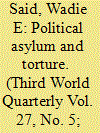

|
|
|
|
|
| Publication |
2006.
|
| Summary/Abstract |
This article examines generally the issue of whether deportation to a country that would almost assuredly torture the individual in question can ever be justified under international law, even when that individual is accused of having links to international terrorism. Specifically, this article provides an analysis of the legal responses of three major common law countries-the USA, Canada, and the UK-in assessing whether or not deportation under such circumstances is consistent with their obligations under international law, and argues that deportation where there is a credible threat of torture can never be countenanced.
|
|
|
|
|
|
|
|
|
|
|
|
|
|
|
|
| 11 |
ID:
074639


|
|
|
|
|
| Publication |
2006.
|
| Summary/Abstract |
This article enquires into the likely posture of future international law with respect to African peoples. It does so by focusing on three of the most important issues that have defined, and are likely to continue to define, international law's engagement with Africans. These are: the grinding poverty in which most Africans live, the question of agency in their historical search for dignity, and the extent to which these African peoples can effectively resist externally imposed frameworks and measures that have negative effects on their social, economic and political experience. International law's future posture in these respects is considered through an examination of concrete debates relating to agricultural subsidies, debt usury and relief therefrom, and the relocation of framework socioeconomic governance of almost every African state to external institutions. Insights about what the future holds for the effectiveness of Third World resistance are derived from a consideration of the broad lessons that can be learned from the successes or failures of some past Third World struggles.
|
|
|
|
|
|
|
|
|
|
|
|
|
|
|
|
| 12 |
ID:
074636


|
|
|
|
|
| Publication |
2006.
|
| Summary/Abstract |
If analysts want to understand the forces that give rise to the sovereign units that make up the 'us' and 'them' comprising the affinities and enmities of enduring inter-state inequality and systemically violent conflict, then we must move beyond the Weberian understanding of the state as an institution that has a monopoly of the legitimate use of violence and towards a deeper understanding of the rules that hold together the state as a membership organisation. This means several things but, for the purposes of this article, imagining the cessation of war and a truly global politics (committed to enabling conditions for the creative recreation of the planet and its inhabitants, regardless of where or to whom they were born) means understanding how all states create the form of the 'other' liable to yield death as an active or passive consequence of their kinship rules.
|
|
|
|
|
|
|
|
|
|
|
|
|
|
|
|
| 13 |
ID:
074645


|
|
|
|
|
| Publication |
2006.
|
| Summary/Abstract |
What is the Zeitgeist of resistance in the present moment-the age of empire? This paper examines key contemporary interventions that invoke international norms to temper and rein in intervention and occupation. Even as they signal dissent, the paper concludes that these interventions turn away from the historical, deny ideological conflict and fail a counter-hegemonic politics. They return to an ahistorical domain of international law and humanist ethics that stands outside time and is blind to that privilege. This is a stance that may contribute to the production of legitimacy for empire, even as it seeks to curb its excesses.
|
|
|
|
|
|
|
|
|
|
|
|
|
|
|
|
| 14 |
ID:
074633
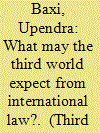

|
|
|
|
|
| Publication |
2006.
|
| Summary/Abstract |
What may the Third World expect from international law? To answer this question, one must begin by interrogating the meaning of the terms 'Third World' and 'international law'. This article argues that the meaning of the term 'Third World' has historically had layers of complexity to it, and it crucially includes not only states but also peoples. On the other hand, grand narrative traditions of the rise and growth of international law remain typically concerned with its 'lawness', the changing nature of its subjects, and its sources. Arguing against such an understanding from a sociological perspective, the article argues that no longer can the re-make of contemporary international law be understood as the exclusive law of the West. It must recognise the authorial role played by the Third World in all its complexity.
|
|
|
|
|
|
|
|
|
|
|
|
|
|
|
|
| 15 |
ID:
074638


|
|
|
|
|
| Publication |
2006.
|
| Summary/Abstract |
This article examines the basis and reality of international legality and the universality of human rights from an Islamic perspective. The author calls for principled commitment and systematic respect for the institutional framework of international legality and the rule of law to encourage Muslims to abandon traditional notions of jihad. Similarly, since the institutional framework of legality and the rule of law in international relations is necessary for the protection of human rights as well, the absence of this framework would undermine the credibility and viability of human rights norms.
|
|
|
|
|
|
|
|
|
|
|
|
|
|
|
|
|
|
|
|
|